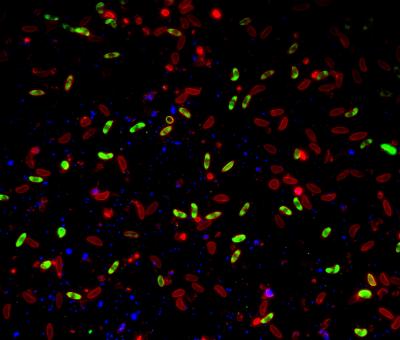The technique will facilitate the design of new tools to block disease transmission

Credit: Oriol Llorà Batlle/ISGlobal
A research team at ISGlobal, an institution supported by the “la Caixa” Foundation, has developed a system to induce massive sexual conversion of the P. falciparum malaria parasite in vitro. This technique, published in Science Advances, will prove instrumental to gain a deeper understanding of the sexual conversion process and design new tools to block malaria transmission.
Plasmodium falciparum is the most lethal of the five malaria parasites that infect humans. It has a complex lifecycle whereby the asexual stage in the blood is responsible for disease symptoms but only the sexual stages (called gametocytes) can infect mosquitoes. Therefore, human to vector transmission requires that some asexual parasites differentiate into gametocytes, a process called sexual conversion. “Understanding how sexual conversion is regulated will provide valuable clues for blocking disease transmission”, says Alfred Cortés, ICREA researcher at ISGlobal, whose team has been working on this process for several years. However, studying the initial stages of sexual conversion in the laboratory is not easy because only a very small proportion of parasites undergo conversion, and those that do cannot be easily distinguished from the other asexual parasites until several days later.
Cortés’s team previously showed that the protein PfAP2-G regulates sexual conversion and that its early expression can lead to an “express” conversion path without additional replication. Using the gene-editing CRISPR-Cas9 system, the team now developed P. falciparum parasites in which the expression of PfAP2-G can be induced by adding a drug called rapamycin. They showed that 90% of the transgenic parasites converted into sexual forms upon induction, enabling the characterization of early sexual stages without further purification. “Our inducible sexual conversion system yields high amounts of parasites synchronised at the initial stages of sexual development, with a purity that had not been achieved by previous approaches”, says Oriol Llorà-Batlle, first author of the study and researcher at ISGlobal, University of Barcelona and Hospital Clínic.
By comparing parasite cultures with or without rapamycin, the team identified 370 genes whose expression was altered upon sexual conversion. The upregulated genes are direct targets of PfAP2-G. Many of the downregulated genes had not been reported to change during sexual development, and could represent potential new markers of asexual parasites. The experiments also revealed functional alterations occurring immediately upon sexual conversion.
“This system can be used to further characterize early sexual parasites, for example at the proteomic and metabolomic level and to test their susceptibility to different drugs,” adds Cortés.
###
Media Contact
Pau Rubio
[email protected]
Original Source
https:/
Related Journal Article
http://dx.




